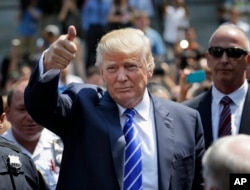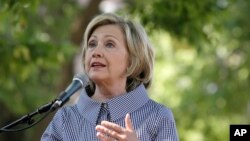Republican Donald Trump and Democrat Hillary Clinton are the two frontrunners for their party’s presidential nominations at this early stage of the 2016 campaign.
But other than leading in the polls, their political fortunes seem to be diverging at the moment.
New national surveys suggest the Trump bandwagon rolls on with no end in sight.
The latest CNN/ORC poll has Trump leading the Republican field nationally with 24 percent, followed by former Florida Governor Jeb Bush at 13 percent and retired neurosurgeon and political newcomer Ben Carson at 8 percent. A Fox News poll a day earlier had Trump at 25 percent and Carson in second, with 12 percent.
Trump has led national polls among Republicans for weeks now, despite a range of controversial comments that might have undone other contenders.
He has also developed an air of celebrity with his campaign that tends to drown out many of his Republican rivals. A media mob gathered outside the New York State Supreme Court in Lower Manhattan on Monday as he reported for jury duty.
Trump has been able to do something unique: transform his status as media celebrity and a non-politician into political capital.
Hard line on immigration
Trump has begun to release details about some of his policy positions, including immigration, where he favors the deportation of millions of illegal immigrants.
He also favors an end to “birthright citizenship,” the Constitutional right of those born in the United States to citizenship even if the parents came into the country illegally.
Both ideas have been controversial for years and some party leaders have warned that moving in that direction would further alienate Hispanic voters from the Republican brand, something that hurt presidential candidate Mitt Romney in 2012.
Despite those concerns, some of Trump’s rivals, including Wisconsin Governor Scott Walker, have expressed support for his tough line on immigration, while others, including Bush, Carly Fiorina and South Carolina Senator Lindsey Graham, are skeptical.
Trump’s plan has also drawn fire from Democrats and pro-immigration activists such as Cristina Jimenez of United We Dream.
Jimenez said Trump’s plan to build a wall along the Mexican border and deport illegals is “dehumanizing and hateful,” adding, "it is morally wrong and goes against the values of this country.”
Clinton's email flap
Democratic frontrunner Clinton had a busy weekend in Iowa fending off media inquiries about the controversy over her email practices while secretary of state.
Clinton’s private server is now in the hands of the FBI as investigators check to see if any classified information was improperly transmitted over the private account.
She told reporters at the Iowa State Fair in Des Moines that she never sent or received classified information over her private email account that was so designated at the time.
The email controversy has fueled concerns about Clinton’s trustworthiness, according to numerous polls.
She also faces a stronger-than-expected challenge from Vermont Senator Bernie Sanders, who continues to draw large, enthusiastic crowds of progressives looking for an alternative to Clinton.
Clinton still holds a sizable lead nationwide, but Sanders is making progress in the early contest states of Iowa and New Hampshire. In fact, one recent poll in the Granite State showed Sanders with a six-point lead over Clinton.
Clinton has been hounded by reporters about the email controversy and Republicans have been eager to join in, demanding that she deal directly with the issue and not cast it as a “partisan distraction,” as she often does on the campaign trail.
The email controversy has grown to the point where some Democrats have wondered if it is time for Vice President Joe Biden to enter the race, or perhaps former Vice President Al Gore.
Biden reportedly is considering the idea and could decide within a matter of weeks.
The situation regarding Gore seems murkier, and some Democratic operatives are questioning whether he is serious about even considering another White House bid following his loss in 2000 to Republican George W. Bush.
Defying expectations
The contrast between the two current frontrunners is remarkable, given the expectations for both at the beginning of the 2016 campaign cycle.
Clinton was seen as a virtual lock as the Democratic nominee and a favorite to defeat any of the Republican hopefuls. She may yet win the party nomination but will have to ease some doubts over the next few months.
Trump was not taken seriously by many analysts, and many commentators said it was merely a matter of time before he said or did something that would begin the unraveling of his campaign.
It hasn’t worked out that way.
When Trump first announced, many of the experts wrote him off as a “curiosity candidate,” unlikely to break out of the bottom tier in a crowded Republican field.
But Trump’s uncanny ability to tap into voter anger and frustration has been eye-opening for his rivals, many of whom are now trying to find ways to tap that same vein.
In the meantime, the Trump campaign rolls on, defying expert predictions and forcing strategists for his rivals to ponder whether it is time for a more confrontational approach to dealing with “The Donald,” something none of them expected to deal with just weeks ago.







